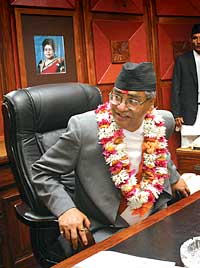 From 7,000km away the goings on in Nepal look like a tragic-comedy. Let me try to get a handle on this:
From 7,000km away the goings on in Nepal look like a tragic-comedy. Let me try to get a handle on this:
When King Gyanendra announced the vacancy for the post of prime minister, the major political parties could not agree on a prime ministerial candidate leaving the king with a free hand to pick a man of his choice. Now, with the appointment of Sher Bahadur Deuba, the parties still remain divided. There are new disagreements between the parties and within the parties.
The UML took over two weeks just to come up with conditions to support the government. First, the party's Standing Committee discussed it. As it could not reach any conclusion, the matter was handed over to the party's Central Committee. The Central Committee discussed the matter for several days only to pass the buck back to the Standing Committee.
The Standing Committee then came up with an over 50-point proposal, which the party said, the new government needed to follow, if it was to receive the party's cooperation. This author wonders if the UML would be able to implement its own proposals had it been given the responsibility of leading the government.
The Nepali Congress, on the other hand, has said it would only support Deuba if he restored the dissolved parliament. Again, the question is, had Girija Prasad Koirala been appointed as prime minister, would he have been ready to recommend the king restore the dissolved House?
Why are all these conditions being imposed on Deuba? Do the parties want to resolve the problem the country is currently facing or further compound it? If the resolution of the crisis is the top priority, then there can be only two conditions: the restoration of democratic process and the resolution of the Maoist insurgency. Only the issues directly related to those two conditions should be considered at this moment. This is not the time to bring up the issues of secularism and the 1950 Indo-Nepal treaty.
There was no guarantee that the king would have accepted the choice of the five agitating parties if they had made a unanimous recommendation. They failed to do that. In the absence of such a candidate, Deuba's appointment was not a bad choice after all. Technically, Deuba may not be very different from his two predecessors- he was appointed under the same constitutional provision. However, politically the appointment of the man who was sacked for 'incompetence' is itself an acknowledgement by the king that his action was wrong.
Therefore, comparing Deuba's position with that of Lokendra Bahadur Chand or Surya Bahadur Thapa is incorrect. Deuba, moreover, has a democratic credential not less than that of Koirala or Nepal. There is no reason why he should not be trusted in dealing with the prevailing crisis. It will only help the 'regression' and the 'rebellion' if parties try to impose their own conditions on him.
The best way forward for the major political parties will be to fully support Deuba and join his government-not ask him to meet their conditions before any concrete gestures could be made. That will allow all the parties to sit together and come up with a unanimous view, which the king will find hard to deny. Unless that happens, it is very unlikely that the current crisis will be resolved. Lack of unity among the political parties means greater benefit to the forces to the left and the right, a series of new governments, deepening of the crisis and, probably, the destruction of the country. It is up to the political parties to take some responsibility.



